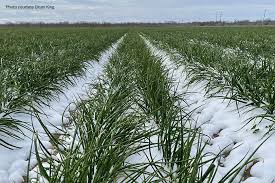‘Frost damage could lead to artificial food shortages’
Agronomists and farmers in the Matabeleland region warn that the ongoing severe cold spell expected to end today could harm various crops, potentially leading to artificial supply shortages.
The possible harm to vegetables carries significant implications for the agricultural sector and food security in the area.
They said vegetables such as cabbages, rape, chomolia, peas, cowpeas, carrots, beetroot, tomatoes, eggplants, broccoli, garlic, cauliflower, covo, Irish potatoes, sweet potatoes, pepper, onions, spinach, lettuce, beans, pumpkins and okra are at risk.
Last week, the Meteorological Services Department (MSD) said a cold spell was expected to hit Zimbabwe from Friday stretching up to Wednesday with temperatures projected to drop to as low as three degrees.
In an interview, SeedCo’s sales and marketing agronomist for Matabeleland, Mr Tony Moyo, said that frost can have various negative impacts on vegetables, such as harming plant tissue, stunting growth, raising vulnerability to diseases, altering taste and texture and shortening shelf life.
“When frost occurs, ice crystals form within the plant cells, causing damage or death, leading to wilting, discolouration and tissue breakdown,” he said.
He noted that frost can stunt plant growth, reducing yields and preventing full maturity.
Damaged plants become more prone to fungal diseases and bacterial infections, further compromising their quality.
“Moreover, frost-damaged vegetables often have an altered taste, losing sweetness and developing a tougher, more fibrous texture. Finally, these damaged vegetables spoil faster after harvesting, as the cellular damage accelerates the decay process, reducing their shelf life.”
Industrialist and Association for Business in Zimbabwe (Abuz) chief executive officer, Mr Victor Nyoni said affected vegetables struggle to reach their maturity stage and become of poor quality.
“The yields are definitely going to be much lower. We are still compiling figures of damaged crops but definitely run into hundreds of thousands of dollars. This is not the first time farmers have been hit by frost and suffered losses. The long term solution is for farmers to invest in Green houses. There are traditional methods such as putting fires around the fields and spreading smoke across the field.”
“The current loss of crops means that farmers have lost so much investment and it will take more time for farmers to recover. Clearly, farmers will require some capital injection to recover and bring back normal prices in the system,” said Mr Nyoni.
Matabeleland South Agricultural Rural Development and Advisory Services Officer, Mr Mkhunjulelwa Ndlovu said frost has affected the texture and nutrient composition of the leaf crop in horticulture programmes.
“Farmers are replanting in other gardens and also putting in some crops that are less prone to frost and early maturity, “ he said .
Mr Ndlovu further said that shortages in hard hit areas, consumers will experience high cost of commodities.-chroncile











